1. Introduction
This page summarizes the results for the 2025 edition of the Model Checking Contest (MCC’2025). This page is divided in three sections:
- First, we list the qualified tools for the MCC'2025,
- Then, we provide some informations about the experimental conditions of the MCC'2025,
- Then, we present an access to details about results,
- Then, we provide the list of winners of the MCC'2025,
- Finally, we provide an attempt to evaluate tool reliability based on the comparison of the results provided in the contest.
IMPORTANT:all these documents can be reused in scientific material and papers but must respect the Creative Common license CC-BY-NC-SA.
2. List of Qualified Tools in 2025
5 tools where submitted this year. They all successfully went through a qualification process requiring about 1625 runs (each tool had to answer each examination for the first instance of each «known» model).
Data about these tools are summarized in the table below. For any tool, you can download the disk image that was provided with all its data. You may use these to reproduce measures locally and perform comparison with your own tool on the same benchmark. Please note that one tool (with two variants) was out of competition this year: this was agreed between the tool developer and the organizers and is part of an experiment with precomputed deep-learning.
IMPORTANT: all tool developers agreed to provide the original image disk embedding the tool they submitted his year (see links in the table below). You may operate these tools on your own. To do so, you need the second disk image (mounted by the other one) that contains all models for 2025 together with the produced formulas. This image is mounted with the default configuration, as well as in he default disk image provided in the tool submission kit (see here).
IMPORTANT: You also have access to the archive containing all models and the corresponding formulas for 2025 here.
IMPORTANT: Note that 2024-gold is an hybrid artificial tool made with the tools that won categories in 2024. It correspond usually to several virtual machines, so the corresponding archive is a bit larger. For the MCC'2025, 2024-gold is composed as follows:
- TINA.tedd for the StateSpace Category
- ITS-Toolsfor the UpperBounds category
- GreatSPN+redfor the GlobalProperties categories
- Tapaalfor Reachability Formulas, CTL Formulas and LTL Formulas categories
The table below presents all participating tools for 2025.
| Summary of the Participating Tools | ||||||
| Tool name | Supported Petri nets |
Representative Author | Origin | Type of execution | Link to the submitted disk image | |
|---|---|---|---|---|---|---|
| 2024-gold | P/T and colored | Fabrice Kordon | Aalborg/Paris/Toulouse | Collateral Processing |  |
|
| enPAC | P/T and colored | Cong He & Shuo Li | Tongji University, Shanghai (China) | Sequential Processing |  |
|
| ITS-Tools | P/T and colored | Yann Thierry-Mieg | Sorbonne Université (France) | Collateral Processing |  |
|
| smpt | P/T and colored | Nicolas Amat | LAAS-CNRS (France) & IMDEA (Spain) | Collateral Processing |  |
|
| Tapaal | P/T and colored | Jiri Srba | Aalborg University (Denmark) | Collateral Processing |  |
|
| TINA.tedd | P/T and colored | Bernard Berthomieu | LAAS-CNRS (France) | Collateral Processing |  |
|
The table below lists the techniques reported per examination (and for all the tool variants when applicable).
| Techniques Reported by the Participating Tools (per examination) | |||||||
| Tool name | StateSpace | GlobalProperties | UpperBounds | Reachability | CTL | LTL | All together |
|---|---|---|---|---|---|---|---|
| 2024-gold | COLLATERAL_PROCESSING DECISION_DIAGRAMS EXPLICIT LATTICE_POINTS_COUNTING LINEAR_EQUATIONS STRUCTURAL_REDUCTION TOPOLOGICAL UNFOLDING_TO_PT USE_NUPN | BESTFIRST_WALK CONSTANT_TEST CPN_APPROX DEADLOCK_TEST DECISION_DIAGRAMS EXHAUSTIVE_WALK INITIAL_STATE INVARIANTS MARKED_SUFFIX_TEST PARALLEL_PROCESSING PARIKH_WALK PROBABILISTIC_WALK QUASI_LIVE_REVERSIBLE QUASILIVENESS_TEST RANDOM_WALK SAT_SMT SCC_TEST SIPHON_TEST SKELETON_TEST SMT_REFINEMENT STRUCTURAL STRUCTURAL_REDUCTION TOPOLOGICAL TRIVIAL_UNMARKED_SCC_TEST UNFOLDING_TO_PT USE_NUPN | BESTFIRST_WALK COVER_WALK CPN_APPROX DECISION_DIAGRAMS INITIAL_STATE PARIKH_WALK RANDOM_WALK REACHABILITY_MAX REACHABILITY_MIN SAT_SMT TOPOLOGICAL USE_NUPN | COLLATERAL_PROCESSING CPN_APPROX EXPLICIT LP_APPROX QUERY_REDUCTION SAT_SMT STATE_COMPRESSION STRUCTURAL_REDUCTION STUBBORN_SETS TRACE_ABSTRACTION_REFINEMENT UNFOLDING_TO_PT | COLLATERAL_PROCESSING CPN_APPROX CTL_CZERO EXPLICIT LP_APPROX QUERY_REDUCTION SAT_SMT STATE_COMPRESSION STRUCTURAL_REDUCTION STUBBORN_SETS TRACE_ABSTRACTION_REFINEMENT UNFOLDING_TO_PT | AUT_STUB AUTOMATON_HEUR COLLATERAL_PROCESSING DIST_HEUR EXPLICIT HEURISTIC LOGFIRECOUNT_HEUR(5000) LP_APPROX NDFS QUERY_REDUCTION RANDOM_HEUR SAT_SMT STATE_COMPRESSION STRUCTURAL_REDUCTION STUBBORN STUBBORN_SETS TARJAN UNFOLDING_TO_PT WEAK_SKIP | AUT_STUB AUTOMATON_HEUR BESTFIRST_WALK COLLATERAL_PROCESSING CONSTANT_TEST COVER_WALK CPN_APPROX CTL_CZERO DEADLOCK_TEST DECISION_DIAGRAMS DIST_HEUR EXHAUSTIVE_WALK EXPLICIT HEURISTIC INITIAL_STATE INVARIANTS LATTICE_POINTS_COUNTING LINEAR_EQUATIONS LOGFIRECOUNT_HEUR(5000) LP_APPROX MARKED_SUFFIX_TEST NDFS OPTIM-1 PARALLEL_PROCESSING PARIKH_WALK PROBABILISTIC_WALK QUASI_LIVE_REVERSIBLE QUASILIVENESS_TEST QUERY_REDUCTION RANDOM_HEUR RANDOM_WALK REACHABILITY_MAX REACHABILITY_MIN SAT_SMT SCC_TEST SIPHON_TEST SKELETON_TEST SMT_REFINEMENT STATE_COMPRESSION STRUCTURAL STRUCTURAL_REDUCTION STUBBORN STUBBORN_SETS TARJAN TOPOLOGICAL TRACE_ABSTRACTION_REFINEMENT TRIVIAL_UNMARKED_SCC_TEST UNFOLDING_TO_PT USE_NUPN WEAK_SKIP |
| enPAC | — | — | — | — | — | COLLATERAL_PROCESSING STATE_COMPRESSION USE_NUPN | COLLATERAL_PROCESSING STATE_COMPRESSION USE_NUPN |
| ITS-Tools | DECISION_DIAGRAMS TOPOLOGICAL USE_NUPN | BESTFIRST_WALK COLLATERAL_PROCESSING CONSTANT_TEST CPN_APPROX DEADLOCK_TEST DECISION_DIAGRAMS EXHAUSTIVE_WALK EXPLICIT INITIAL_STATE INVARIANTS LTSMIN MARKED_SUFFIX_TEST PARIKH_WALK PARTIAL_ORDER PROBABILISTIC_WALK QUASI_LIVE_REVERSIBLE QUASILIVENESS_TEST RANDOM_WALK SAT_SMT SCC_TEST SIPHON_TEST SKELETON_TEST SMT_REFINEMENT STRUCTURAL STRUCTURAL_REDUCTION TOPOLOGICAL TRIVIAL_UNMARKED_SCC_TEST USE_NUPN | BESTFIRST_WALK COVER_WALK CPN_APPROX DECISION_DIAGRAMS INITIAL_STATE PARIKH_WALK RANDOM_WALK REACHABILITY_MAX REACHABILITY_MIN SAT_SMT TOPOLOGICAL USE_NUPN | BESTFIRST_WALK COLLATERAL_PROCESSING CPN_APPROX DECISION_DIAGRAMS EXHAUSTIVE_WALK EXPLICIT INITIAL_STATE LTSMIN OVER_APPROXIMATION PARIKH_WALK PARTIAL_ORDER PROBABILISTIC_WALK RANDOM_WALK SAT_SMT SMT_REFINEMENT STRUCTURAL_REDUCTION TOPOLOGICAL USE_NUPN | BESTFIRST_WALK COLLATERAL_PROCESSING DECISION_DIAGRAMS EXHAUSTIVE_WALK INITIAL_STATE OVER_APPROXIMATION PARIKH_WALK PROBABILISTIC_WALK RANDOM_WALK SMT_REFINEMENT TOPOLOGICAL USE_NUPN | DECISION_DIAGRAMS EXPLICIT HOA INITIAL_STATE KNOWLEDGE LENGTHENING_INSENSITIVE LTSMIN PARTIAL_ORDER REACHABILITY_KNOWLEDGE SAT_SMT SHORTENING_INSENSITIVE STACK_TEST STUTTER_TEST TOPOLOGICAL USE_NUPN | BESTFIRST_WALK COLLATERAL_PROCESSING CONSTANT_TEST COVER_WALK CPN_APPROX DEADLOCK_TEST DECISION_DIAGRAMS EXHAUSTIVE_WALK EXPLICIT HOA INITIAL_STATE INVARIANTS KNOWLEDGE LENGTHENING_INSENSITIVE LTSMIN MARKED_SUFFIX_TEST OVER_APPROXIMATION PARIKH_WALK PARTIAL_ORDER PROBABILISTIC_WALK QUASI_LIVE_REVERSIBLE QUASILIVENESS_TEST RANDOM_WALK REACHABILITY_KNOWLEDGE REACHABILITY_MAX REACHABILITY_MIN SAT_SMT SCC_TEST SHORTENING_INSENSITIVE SIPHON_TEST SKELETON_TEST SMT_REFINEMENT STACK_TEST STRUCTURAL STRUCTURAL_REDUCTION STUTTER_TEST TOPOLOGICAL TRIVIAL_UNMARKED_SCC_TEST USE_NUPN |
| smpt | — | — | — | BMC BULK COLLATERAL_PROCESSING COLORED_WALK COMPOUND DUPLICATE IMPLICIT INITIAL_MARKING NET_UNFOLDING PARIKH PDR_REACH_SATURATED PROJECTION SAT_SMT SKELETON SLICING STATE_EQUATION STRUCTURAL_REDUCTION TAUTOLOGY TOPOLOGICAL UNFOLDING_TO_PT USE_NUPN WALK | — | — | BMC BULK COLLATERAL_PROCESSING COLORED_WALK COMPOUND DUPLICATE IMPLICIT INITIAL_MARKING NET_UNFOLDING PARIKH PDR_REACH_SATURATED PROJECTION SAT_SMT SKELETON SLICING STATE_EQUATION STRUCTURAL_REDUCTION TAUTOLOGY TOPOLOGICAL UNFOLDING_TO_PT USE_NUPN WALK | Tapaal | — | COLLATERAL_PROCESSING CPN_APPROX CTL_CZERO EXPLICIT LP_APPROX QUERY_REDUCTION SAT_SMT STATE_COMPRESSION STRUCTURAL_REDUCTION STUBBORN_SETS TRACE_ABSTRACTION_REFINEMENT UNFOLDING_TO_PT | COLLATERAL_PROCESSING CPN_APPROX EXPLICIT QUERY_REDUCTION SAT_SMT STATE_COMPRESSION STRUCTURAL_REDUCTION STUBBORN_SETS TRACE_ABSTRACTION_REFINEMENT | COLLATERAL_PROCESSING COLOR_IGNORANT CPN_APPROX CPN_EXPLICIT EXPLICIT LP_APPROX QUERY_REDUCTION SAT_SMT STATE_COMPRESSION STRUCTURAL_REDUCTION STUBBORN_SETS TRACE_ABSTRACTION_REFINEMENT UNFOLDING_TO_PT | COLLATERAL_PROCESSING CPN_APPROX CTL_CZERO EXPLICIT LP_APPROX QUERY_REDUCTION SAT_SMT STATE_COMPRESSION STRUCTURAL_REDUCTION STUBBORN_SETS TRACE_ABSTRACTION_REFINEMENT UNFOLDING_TO_PT | AUT_STUB AUTOMATON_HEUR COLLATERAL_PROCESSING DIST_HEUR EXPLICIT HEURISTIC LOGFIRECOUNT_HEUR(5000) LP_APPROX NDFS QUERY_REDUCTION RANDOM_HEUR SAT_SMT STATE_COMPRESSION STRUCTURAL_REDUCTION STUBBORN STUBBORN_SETS TARJAN UNFOLDING_TO_PT WEAK_SKIP | AUT_STUB AUTOMATON_HEUR COLLATERAL_PROCESSING COLOR_IGNORANT CPN_APPROX CPN_EXPLICIT CTL_CZERO DIST_HEUR EXPLICIT HEURISTIC LOGFIRECOUNT_HEUR(5000) LP_APPROX NDFS OPTIM-1 QUERY_REDUCTION RANDOM_HEUR SAT_SMT STATE_COMPRESSION STRUCTURAL_REDUCTION STUBBORN STUBBORN_SETS TARJAN TRACE_ABSTRACTION_REFINEMENT UNFOLDING_TO_PT WEAK_SKIP |
| TINA.tedd | COLLATERAL_PROCESSING DECISION_DIAGRAMS EXPLICIT LATTICE_POINTS_COUNTING LINEAR_EQUATIONS STRUCTURAL_ANALYSIS STRUCTURAL_REDUCTION TOPOLOGICAL UNFOLDING_TO_PT USE_NUPN | — | — | — | — | — | COLLATERAL_PROCESSING DECISION_DIAGRAMS EXPLICIT LATTICE_POINTS_COUNTING LINEAR_EQUATIONS STRUCTURAL_ANALYSIS STRUCTURAL_REDUCTION TOPOLOGICAL UNFOLDING_TO_PT USE_NUPN |
3. Experimental Conditions of the MCC'2025
Each tool was submitted to 24 115 executions in various conditions (1 855 model/instances and 13 examinations per model/instance) for which it could report: DNC (do not compete), CC (cannot compute) or the result of the query. These executions were handled by BenchKit, that was developed in the context of the MCC for massive testing of software. Then, from the raw data provided by BenchKit, some post-analysis scripts consolidated these and computed a ranking.
16 GB of memory were allocated to each virtual machine (both parallel and sequential tools) and a confinement of one hour was considered (execution aborted after one hour). So, a total of 281 112 runs (execution of one examination by the virtual machine) generated 84 GB of raw data (essentially log files and CSV of sampled data).
The table below shows some data about the involved machines and their contribution to the computation of these results. This year, we affected only physical cores to the virtual machines (discarding logical cores obtained from hyper-threading) so the balance between the various machine we used is quite different from he one of past years.
IMPORTANT: due to a configuration problem on one of the submitted tool, information concerning time and memory could not be retrieved, thus making comparisons useless. This is why in 2025, some comparison data are missing.
| Involved Machines and Execution of the Benchmarks | ||||||
| tall | Small | Total | ||||
|---|---|---|---|---|---|---|
| Physical Cores | 15×32 @ 2.1GHz | 23×12 @ 2.4GHz | — | |||
| Memory (GB) | 15×384 | 23×64 | — | |||
| Used Cores (sequential tools) | 15×31, 12×31 VM in // |
23×3, 9×3 VM in // |
— | |||
| Used Cores (parallel tools) | 15×28 (4 per VM), 11×7 VM in // |
23×8 (4 per VM), 9×2 VM in // |
— | |||
| Number of runs | 94 380 | 50 310 | 144 690 | |||
We are pleased to thanks those who helped in the execution of tools:
- Tall (we used 14 nodes) and small (we used 23 nodes) are clusters at LIP6 Sorbonne Université & CNRS.
4. The Results of the MCC’2025
This table below presents detailed results about the MCC'2025.
You can download the full archive (5.3 GB compressed and 24 GB uncompressed) of the 144 690 runs processed to compute the results of the MCC'2025. This archive contains execution traces, execution logs and sampling, as well as a large CSV files that summarizes all the executions. You may get separately the two mostly interesting CSV files:
- GlobalSummary.csv that summarizes all results from all runs in the contest (34 MB when expanded),
- raw-result-analysis.csv that contains the same data as the previous one but enriched with scoring information and the expected results (computed as a majority of tools pondered by their confidence rate, 39 MB when expanded).
Note that from the two CSV file, you can identify the unique run identifier that allows you to find the traces and any information in the archive (they are also available on the web site when the too did participated).
5. The Winners for the MCC'2025
This section presents the results for the main examinations that are:
- State Space generation,
- UpperBounds computation,
- GlobalProperties computation (ReachabilityDeadlock , QuasiLiveness, StableMarking, Liveness, OneSafe),
- Reachability Formulas (ReachabilityCardinality, ReachabilityFireability),
- CTL Formulas (CTLCardinality, CTLFireability),
- LTL Formulas (LTLCardinality, LTLFireability),
To avoid a too large disparity between models with numerous instances and those with only one, a normalization was applied so that the score, for an examination and a model, varies between 102 and 221 points. Therefore, providing a correct value may brings a different number of points according to the considered model. A multiplier was applied depending to the model category:
- ×1 for «Known» models,
- ×13 for «Surprise» models (computed from rule E-4.4 that states «the total score for all “surprise” models instances weight approximatively half the score for all the instances of “known” models»).
Let us remind two «special» tools:
- 2024-gold is an hybrid tool made of the gold-medal for the 2023 edition for each examination. It is a way to evaluate the progress of participants since the last edition of the MCC.
- BVT-2025 (Best Virtual Tool) computes the union of all the values computed by all other tools. It is very often the fastest and the tool having the smallest memory footprint, based on what the participating tool performed. It is a way to evaluate the complementarity between tools by comparing it to the gold medal
WARNING: due to a mistake in one submitted VM, no memory and CPU information this year (crashes our analysis tools + not relevant).
WARNING: due to a lack of time from the execution board, the computation rate (number of total values computed by each tool) could not be computed.
5.1. Winners in the StateSpace Category
3 tools out of 6 participated in this examination (plus 4 reference). Results based on the scoring shown below is:
- tedd ranked first (26 048 pts),
- GreatSPN+red ranked second (20 777 pts),
The the 2024-gold collected 25 697 pts. BVT-2025 (Best Virtual Tool) collected 26 430 pts.
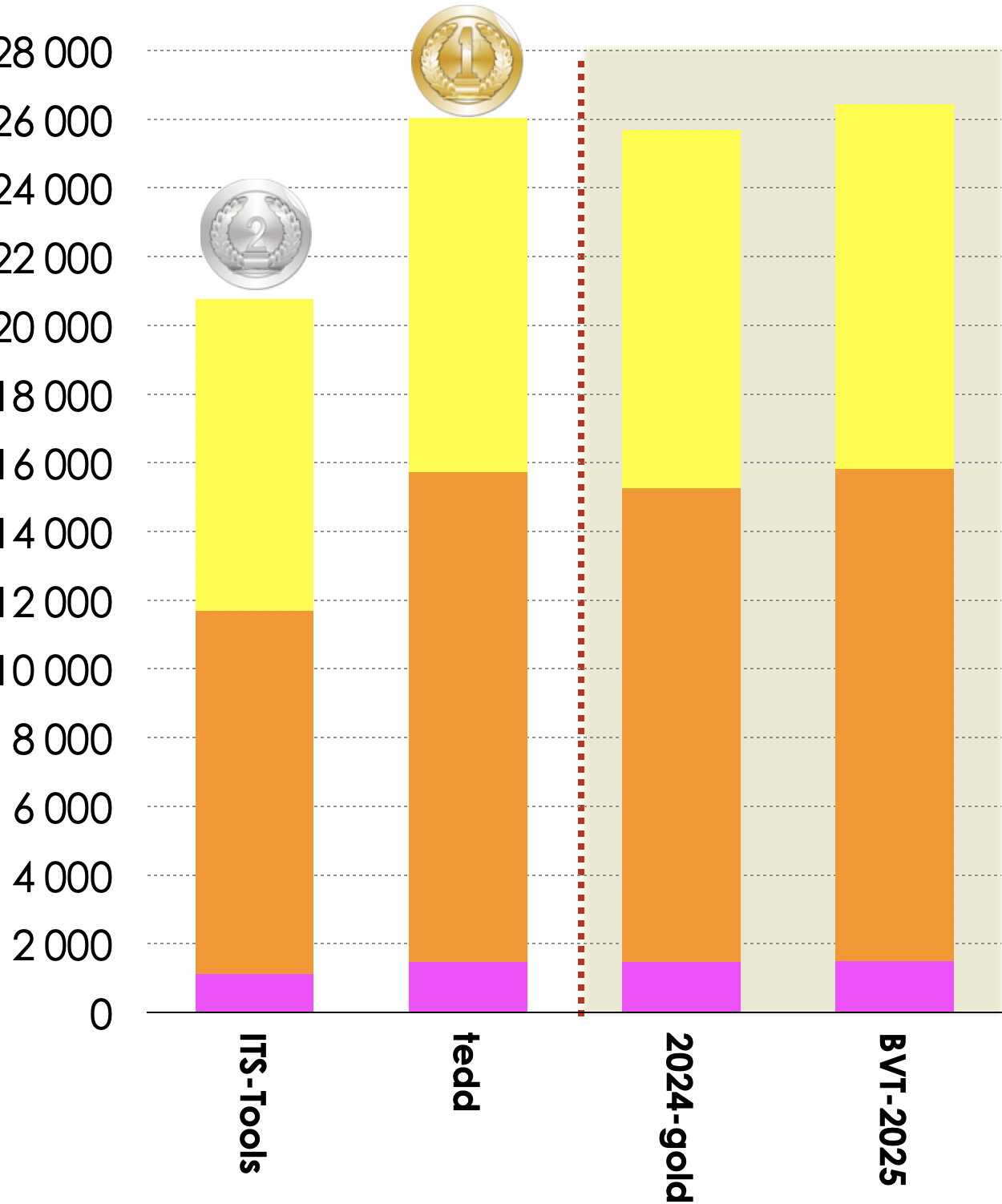 |
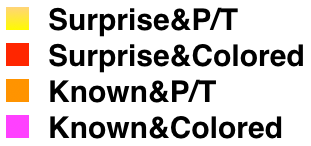 |
| Estimated Tool Confidence rate for StateSpace (based on the «significant values» computed by tools) see section 6. for details |
|||
| Tool name | Reliability | Correct Values | «significant values» |
|---|---|---|---|
| Tools competing in 2025 | |||
| ITS-Tools | 100.000% | 3 253 | 3 253 |
| tedd | 100.000% | 3 253 | 3 253 |
| 2024-gold and BVT-2025 | |||
| 2024-gold | 100.000% | 3 253 | 3 253 |
| BVT-2025 | 100.000% | 3 253 | 3 253 |
Remarks about the StateSpace examination
Some detailed results state that marking ins infinite (use of the value «+Inf********»). There are some infinite models in our benchmark but our analysis tools have a constrains in the representation of very large state spaces which is the one of the Long_Long_Float Ada type (maximum value of 1.0E+4932). When watching the execution report of some tools, you can check weather «+Inf********» really means infinite or not.
5.2. Winners in the GlobalProperties Category
3 tools out of 6 participated in these examinations (ReachabilityDeadlock , QuasiLiveness, StableMarking, Liveness, OneSafe). Results based on the scoring shown below is:
- ITS-Tools ranked first (130 285 pts),
- Tapaal ranked second (108 355 pts).
2024-gold collected 127 565 pts. BVT-2025 (Best Virtual Tool) collected 131 276 pts.
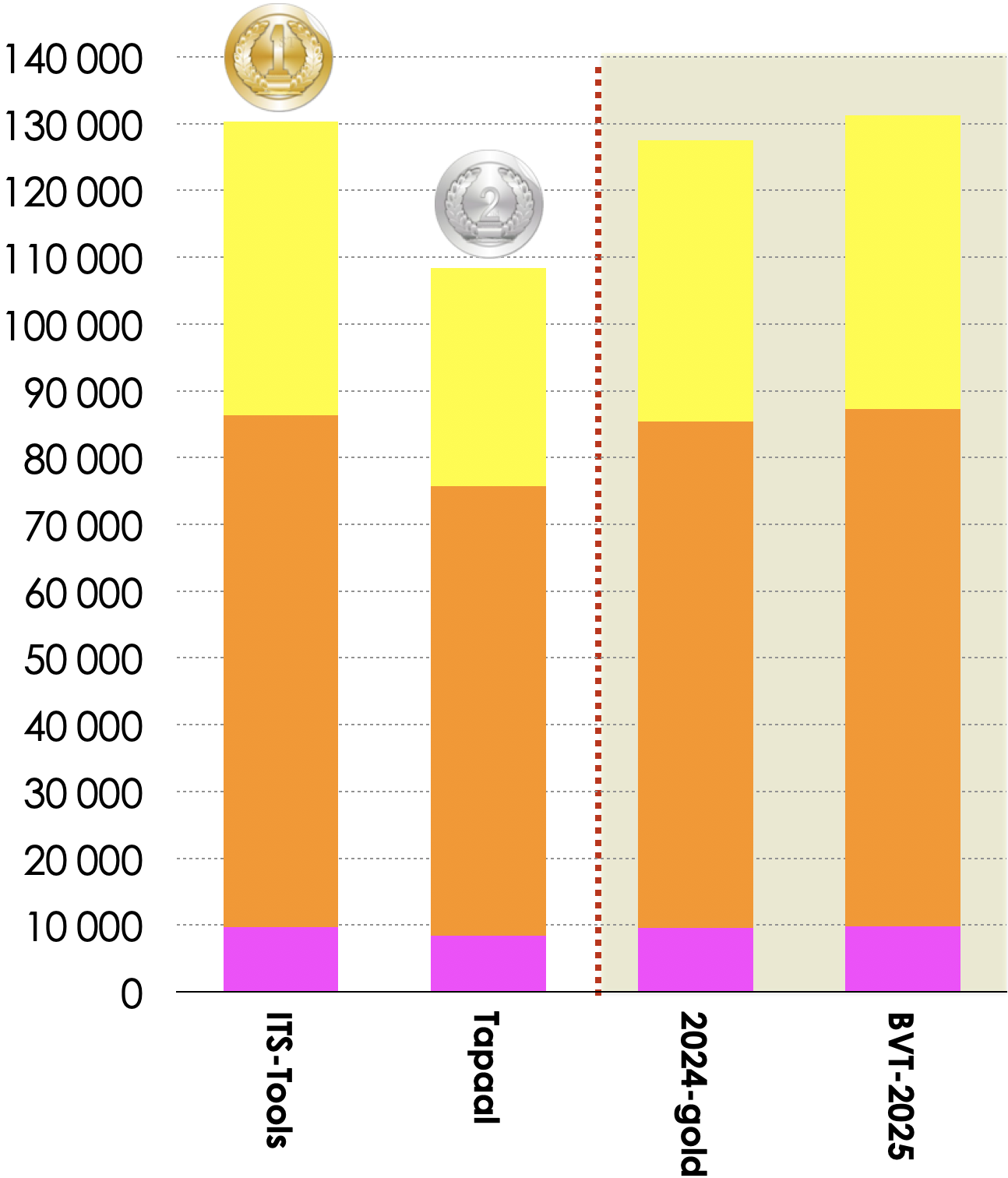 |
 |
| Estimated Tool Confidence rate for GlobalPropertiesScores (based on the «significant values» computed by tools) see section 6. for details |
|||
| Tool name | Reliability | Correct Values | «significant values» |
|---|---|---|---|
| Tools competing in 2024 | |||
| ITS-Tools | 100,000% | 7 564 | 7 564 |
| Tapaal | 99,986% | 7 564 | 7 564 |
| 2024-gold and BVT-2025 | |||
| 2024-gold | 100,000% | 7 564 | 7 564 |
| BVT-2025 | 100,000% | 7 564 | 7 564 |
5.3. Winners in the UpperBounds Category
3 tools out of 6 participated in this examination. Results based on the scoring shown below is:
- ITS-Tools ranked first (26 479 pts),
- Tapaal ranked second (25 395 pts),
2024-gold collected 26 458 pts. BVT-2025 (Best Virtual Tool) collected 26 660 pts.
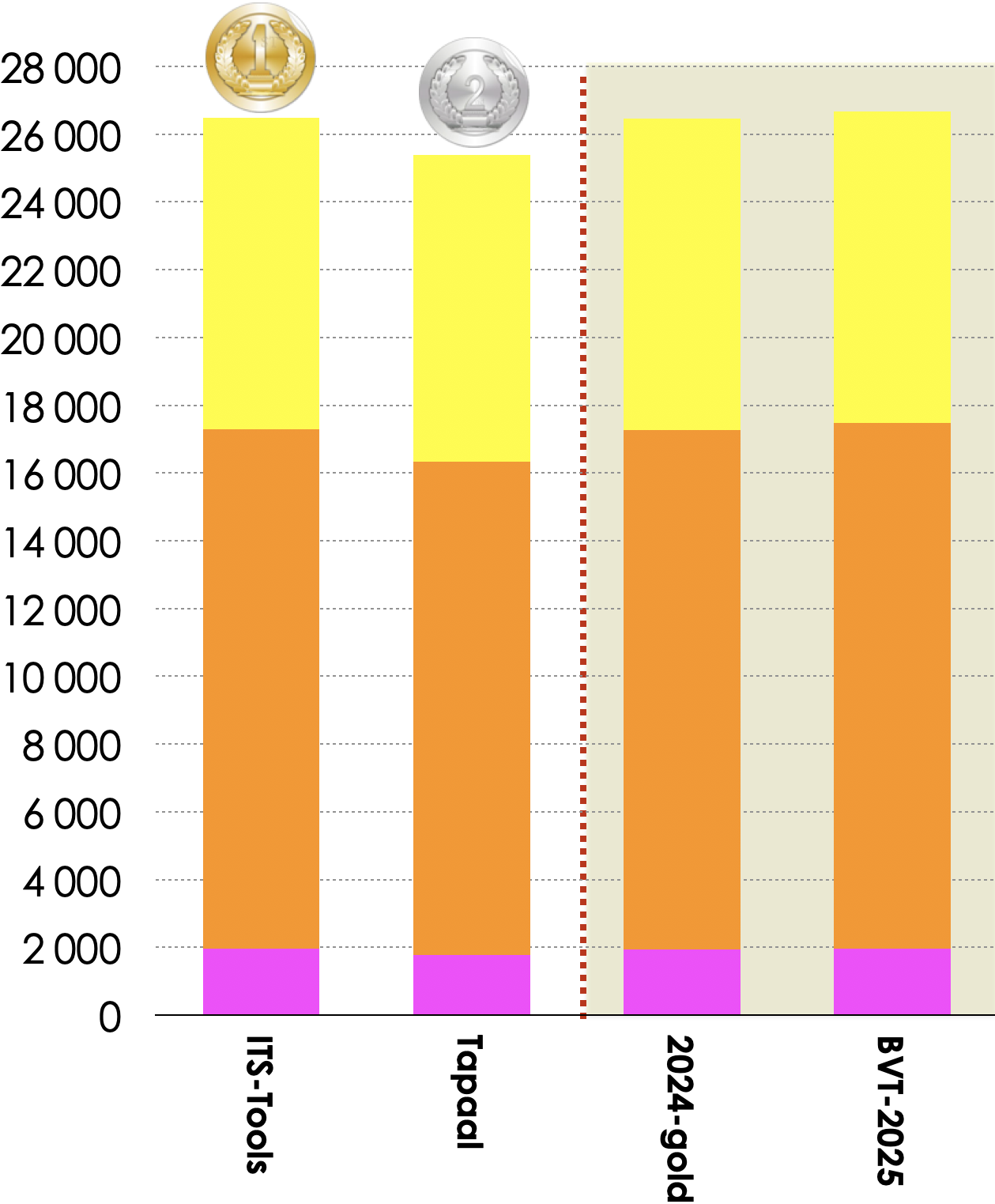 |
 |
| Estimated Tool Confidence rate for UpperBound (based on the «significant values» computed by tools) see section 6. for details |
|||
| Tool name | Reliability | Correct Values | «significant values» |
|---|---|---|---|
| Tools competing in 2024 | |||
| ITS-Tools | 100.000% | 26 567 | 26 567 |
| Tapaal | 100.000% | 26 567 | 26 567 |
| 2024-gold and BVT-2025 | |||
| 2024-gold | 100.000% | 26 567 | 26 567 |
| BVT-2025 | 100.000% | 26 567 | 26 567 |
5.4. Winners in the Reachability Formulas Category
4 tools out of 6 participated in these examinations (ReachabilityCardinality and ReachabilityFireability). Results based on the scoring shown below is:
- Tapaal ranked first (52 819 pts),
- ITS-Tools ranked second (52 174 pts),
- smtp ranked third (39 841 pts).
2024-gold collected 52 345 pts. BVT-2025 (Best Virtual Tool) collected 53 796 pts.
Note that SVSKit only computes Fireability formulas.
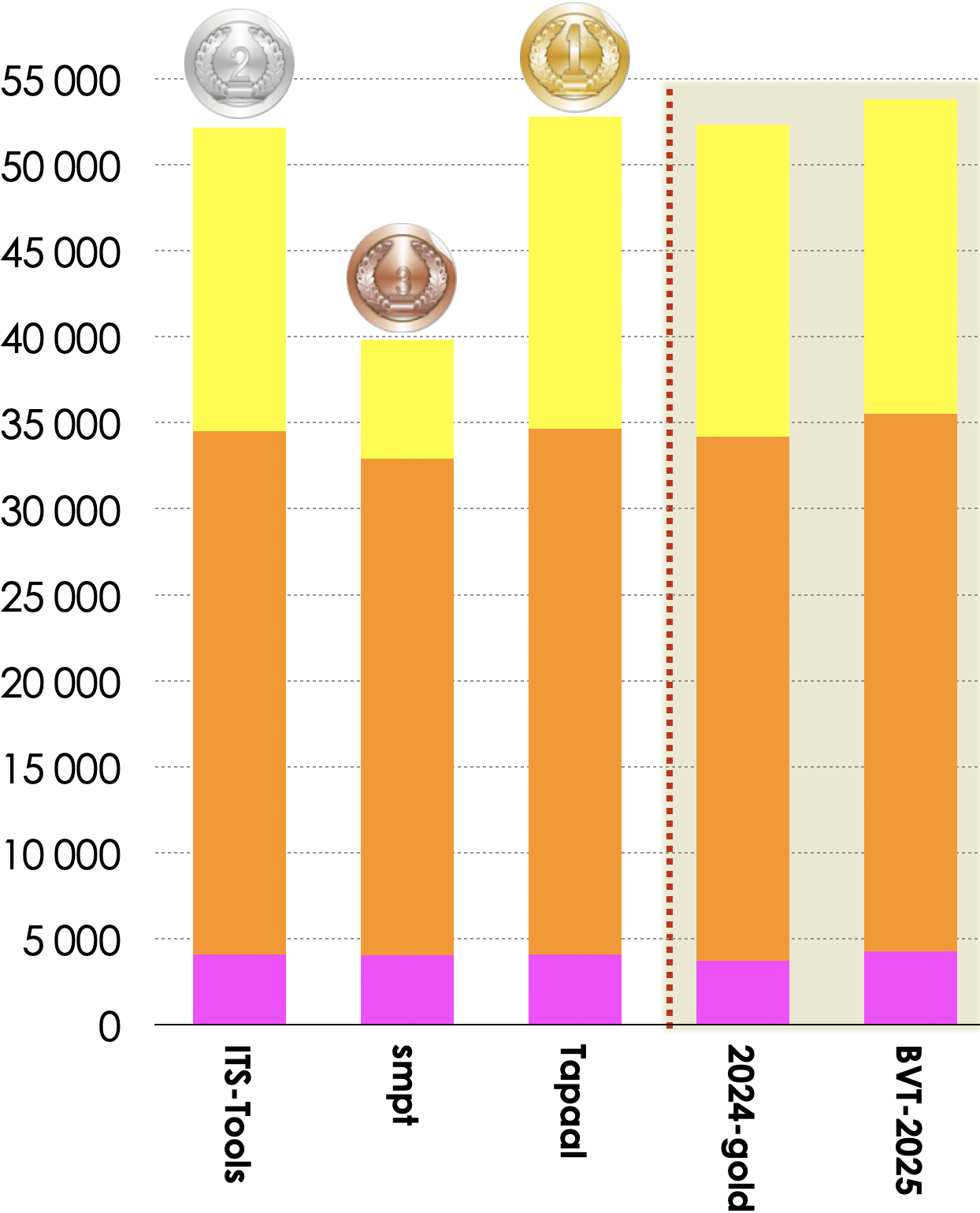 |
 |
| Estimated Tool Confidence rate for Reachability (based on the «significant values» computed by tools) see section 6. for details |
|||
| Tools competing in 2024 | |||
|---|---|---|---|
| ITS-Tools | 99,998% | 54 760 | 54 761 |
| smpt | 100,000% | 50 860 | 50 860 |
| Tapaal | 100,000% | 55 241 | 55 241 |
| 2024-gold and BVT-2025 | |||
| 2024-gold | 99,989% | 54 898 | 54 898 |
| BVT-2025 | 100,000% | 55 257 | 55 257 |
5.5. Winners in the CTL Formulas Category
3 tools out of 6 participated in these examinations (CTLCardinality and CTLFireability). Results based on the scoring shown below is:
- Tapaal ranked first (39 644 pts),
- ITS-Tools ranked second (31 851 pts),
2024-gold collected 39 619 pts. BVT-2025 (Best Virtual Tool) collected 45 143 pts.
Note that SVSKit only computes Fireability formulas.
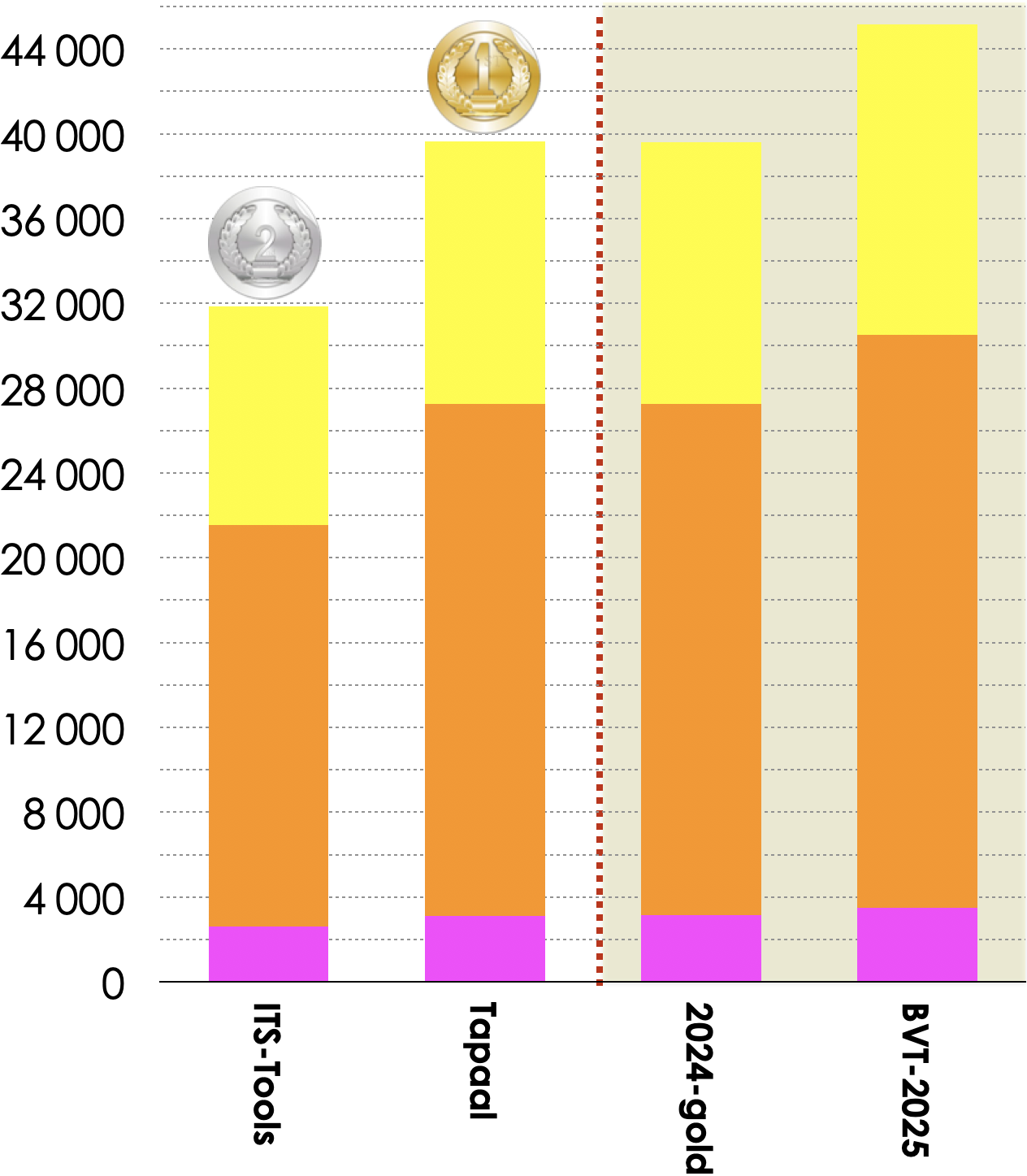 |
 |
| Estimated Tool Confidence rate for CTL (based on the «significant values» computed by tools) see section 6. for details |
|||
| Tool name | Reliability | Correct Values | «significant values» |
|---|---|---|---|
| Tools competing in 2024 | |||
| ITS-Tools | 100,000% | 29 026 | 29 026 |
| Tapaal | 100,000% | 29 026 | 29 026 |
| 2024-gold and BVT-2025 | |||
| 2024-gold | 100,000% | 29 026 | 29 026 |
| BVT-2025 | 100,000% | 29 026 | 29 026 |
5.6. Winners in the LTL Formulas Category
4 tools out of 6 participated in these examinations (LTLCardinality and LTLFireability). Results based on the scoring shown below is:
- Tapaal ranked first (51 422 pts),
- ITS-Tools ranked second (50 818 pts),
- EnPac ranked third (49 333 pts).
2024-gold collected 51 386 pts. BVT-2025 (Best Virtual Tool) collected 53 282.
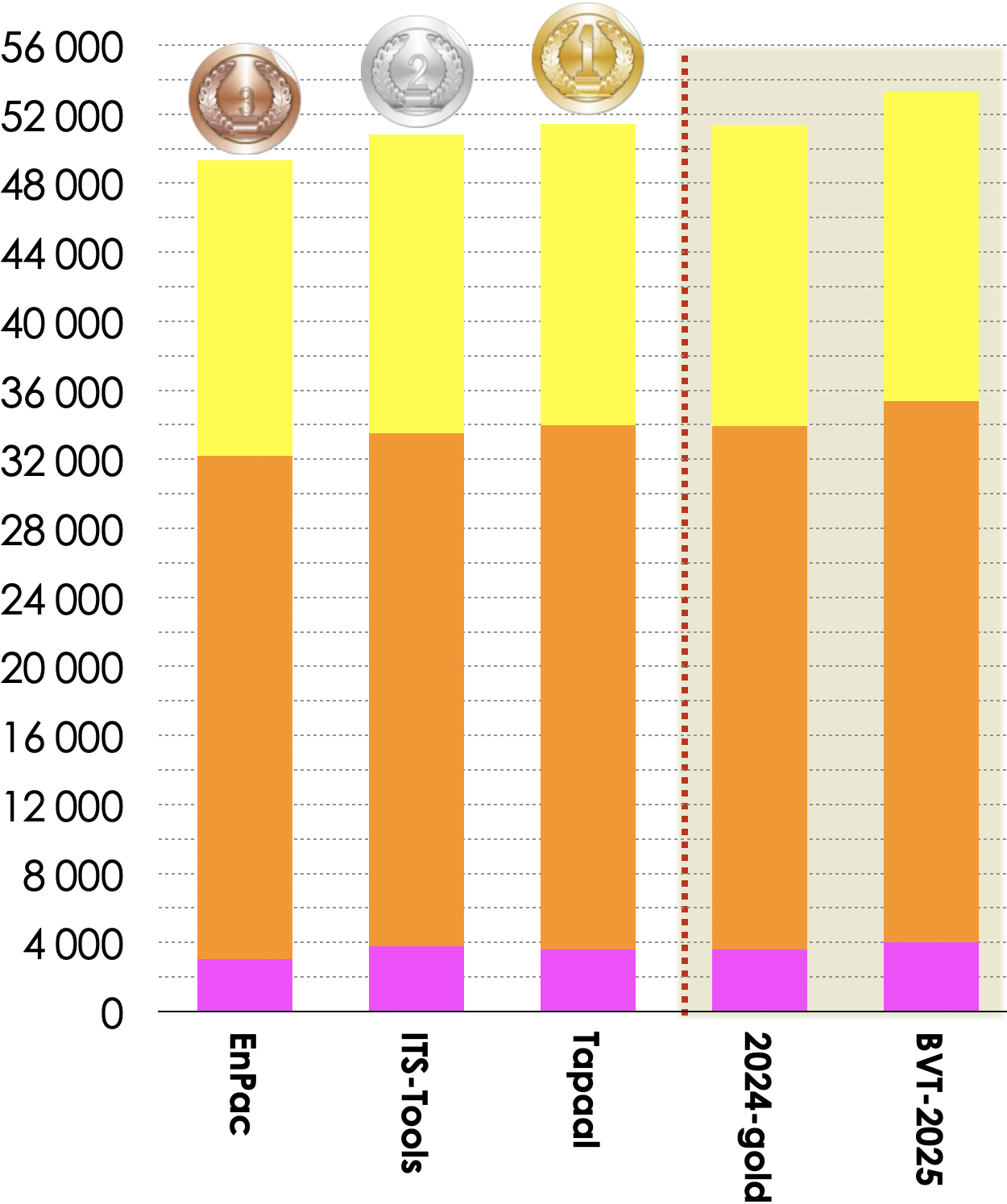 |
 |
| Estimated Tool Confidence rate for LTL (based on the «significant values» computed by tools) see section 6. for details |
|||
| Tools competing in 2024 | |||
|---|---|---|---|
| EnPac | 99,948% | 51 733 | 51 760 |
| ITS-Tools | 99,996% | 52 392 | 52 394 |
| Tapaal | 100,000% | 54 198 | 54 198 |
| 2024-gold and BVT-2025 | |||
| 2024-gold | 100,000% | 54 195 | 54 195 |
| BVT-2025 | 100,000% | 54 214 | 542 14 |
6. Estimation of the Global Tool Confidence
A confidence analysis enforces the computation of «right results» based on the answers of participating tools. To do so, we considered each value provided in the contest (a value is a partial result such as the result of a formula or a number provided for state space, bound computation, etc.). To do so, we processed as follows:
- For each «line» (all tools for a given examination for a given instance), we selected all «significant values» where at least 3 tools do agree.
- Based on this subset of values, we computed the ratio between the selected values for the tool and the number of good answers hey provide for such values. This ratio gave us a tool confidence rate that is provided in the table below.
- This tool confidence rate rate was then applied to compute the scores presented in the dedicated section.
The table below provides, in first column, the computed confidence rates (that are naturally lower for tools where a bug was detected). Then, the table provides the number of correct results (column 2) out of the number of «significant values» selected for the tool (column 3). The last column shows the number of examinations (and their type) the tool was involved in.
| Estimated Tool Confidence rate (based on the «significant values» computed by tools) | ||||
| Tool name | Reliability | Correct Values | «significant values» | Involved Examinations |
|---|---|---|---|---|
| Tools competing in 2025 | ||||
| EnPac | 99.948% | 51 733 | 51 760 | 2LTLCardinality, LTLFireability |
| ITS-Tools | 99.998% | 173 562 | 173 565 | 13 StateSpace, UpperBounds, CTLCardinality, CTLFireability, LTLCardinality, LTLFireability, ReachabilityCardinality, ReachabilityFireability, ReachabilityDeadlock, QuasiLiveness, StableMarking, Liveness, OneSafe |
| smpt | 100.000% | 50 860 | 50 860 | 2 ReachabilityCardinality, ReachabilityFireability |
| Tapaal | 100.000% | 172 596 | 172 596 | 12 UpperBounds, CTLCardinality, CTLFireability, LTLCardinality, LTLFireability, ReachabilityCardinality, ReachabilityFireability, ReachabilityDeadlock, QuasiLiveness, StableMarking, Liveness, OneSafe |
| tedd | 100.000% | 3 253 | 3 253 | 1 StateSpace |
| 2024-gold and BVT-2025 | ||||
| 2024-gold | 100.000% | 175 503 | 175 503 | 13 StateSpace, UpperBounds, CTLCardinality, CTLFireability, LTLCardinality, LTLFireability, ReachabilityCardinality, ReachabilityFireability, ReachabilityDeadlock, QuasiLiveness, StableMarking, Liveness, OneSafe |
| BVT-2025 | 100.000% | 175 830 | 175 830 | 13 StateSpace, UpperBounds, CTLCardinality, CTLFireability, LTLCardinality, LTLFireability, ReachabilityCardinality, ReachabilityFireability, ReachabilityDeadlock, QuasiLiveness, StableMarking, Liveness, OneSafe |

